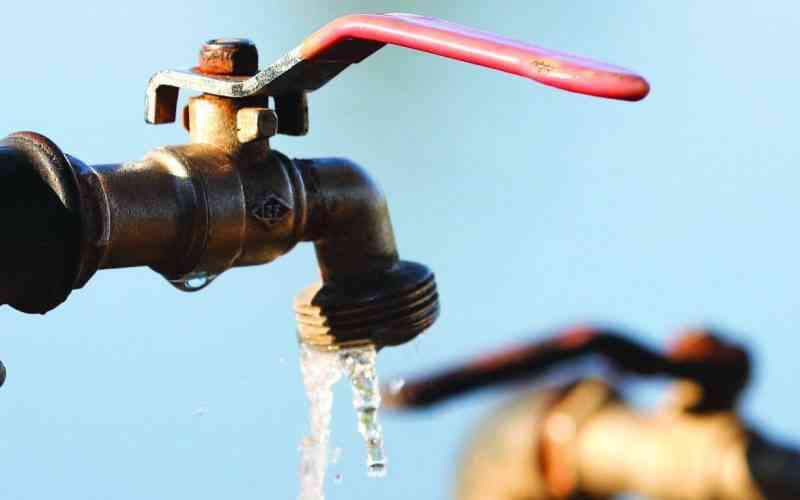Water is life, yet in Kenya, it has become a commodity, a privilege, and a battleground for profit rather than a universal right.
I see the mismanagement of water at both National and County Government levels as a profound failure of governance—one that violates human rights, entrenches inequality, and threatens our collective future.
From the boreholes touted as value-add selling points in upmarket apartments to the water bowsers and jerrycans dotting balconies in cities like Nairobi, the evidence of this crisis is stark.
Follow The Standard
channel
on WhatsApp
At the heart of my critique lies a fundamental disparity: water, essential to survival, is treated with careless abandon compared to oil, a national asset jealously guarded when discovered.
The National Government, tasked with policy, regulation, and large-scale infrastructure under the 2010 Constitution, has failed to prioritize water security. Every rainy season, floods ravage the plains and valleys, only for droughts to parch the same regions months later. Where are the dams to capture this abundance?
The absence of such infrastructure reflects a lack of strategic vision, allowing rivers to drain into the ocean while communities scramble for private solutions. Worse, the National Government does not regard the extraction of groundwater through boreholes as a finite resource akin to oil reserves. Overuse depletes aquifers, lowering water tables within kilometers, yet borehole proliferation continues unchecked, ceding control to private hands.
County Governments, responsible for water service delivery and local regulation, fare no better.
In urban estates, the deafening symphony of water pumps during rationing cycles has been normalized—an anomaly that screams poor planning. High-rise apartments advertise boreholes as a perk, inflating rents and sale prices, while water cartels profit handsomely from the gaps left by unreliable public systems. Counties have reduced their role to licensing borehole prospecting, a passive stance that fuels depletion and inequity.
Meanwhile, waterways like the Nairobi River—lined with informal settlements and choked with waste—stand as monuments to environmental neglect.
This is a gross violation of human rights. Access to water should not be a luxury determined by wealth or geography.
Comparatively, I look to North America, where water towers greet visitors with town names branded proudly—a symbol of water as a collective, transparent resource. In Kenya, our waterways are dumpsites, and our systems are opaque, privatized failures.
I propose a radical shift: delink water management from the National Government and empower citizen-led committees at the ward level to mandate County Governments through petitions or community-county agreements. Kenya needs a reimagining of accountability, placing water governance directly in the hands of those it affects most.
Here is how it works: each ward forms a citizen committee, elected or appointed by residents, to assess local needs—be it piped water in residential estates or storage tanks in rural areas. These committees draft mandates, either as petitions (protected under Article 37 of Kenya’s Constitution) or binding agreements signed with County officials, specifying deliverables like “repair pipelines in XYZ ward within six months.”
Counties, with their technical capacity and funding, execute these mandates, reversing the top-down dynamic. Committees monitor progress, reporting to citizens, and escalate failures through call to action letters to County officials, protests or legal action if needed. The County Government’s role shrinks to funding or regulation, with citizen-led oversight on operational control.
Why wards? Because the current county-wide system is too generalized, diluting accountability. A ward committee in a Nairobi estate plagued by rationing could demand a public tank, while a rural ward might cap boreholes to protect aquifers. This granularity ensures solutions fit local realities, not bureaucratic whims. Cartels thrive where public systems fail, I argue, and direct citizen oversight pressures Counties to outcompete private profiteers, reclaiming water as a public good.
Critics might challenge my proposal on several fronts, but I’ve anticipated these counters and offer mitigations rooted in a social consciousness framework.
Counties might resist, arguing this undermines their devolved mandate. Mitigation lies in advocacy—citizens must demand legislative tweaks to the Water Act 2016, ensuring Counties serve as implementers, not gatekeepers.
Delinking the National Government risks underfunding. Mitigation involves retaining national funding e.g., via the Equalisation Fund but restricting it to a support role—money without meddling.
Ward committees need expertise to draft mandates and monitor compliance—skills lacking in underserved areas. I acknowledge this but argue it’s surmountable. Partner with civil society or universities to train committees on water basics, petition writing, and oversight.
Ward-specific mandates might prioritize wealthy areas, leaving poorer wards behind. I concede the risk but propose a County Water Council—representatives from each ward committee—to balance demands and ensure equity.
Skeptics might argue boreholes differ from oil since water is renewable via rainfall. Aquifers recharge slowly, and overuse depletes them on human timescales, much like oil. Committees must push Counties to invest in surface water solutions—dams, tanks—reducing groundwater reliance.
Water mismanagement is a symptom of a deeper malaise: a governance system that prioritizes expediency over service, profit over people.
The proliferation of boreholes, the normalization of water pumps and the pollution of rivers are not accidents but outcomes of a fractured, unaccountable water management ecosystem.
I urge us to reject the status quo. The symphony of water pumps must end, the rivers must run clean, and the cartels must fade—not because it’s easy, but because it’s just.
Follow The Standard
channel
on WhatsApp
By Lawi Sultan Njeremani


